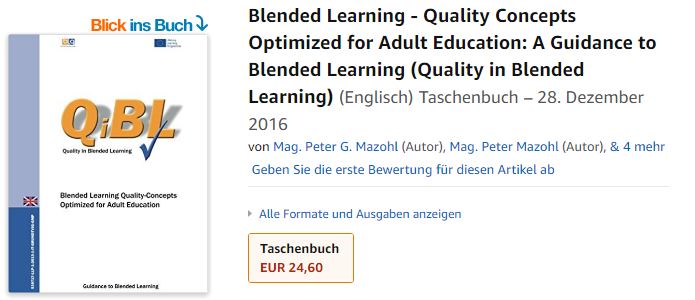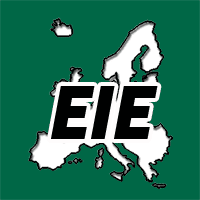Blended Learning
The research work in Blended Learning Quality focuses on course development, quality enhancement, modern self-evaluation technics, and the problems of distance learning.
Peter Mazohl and Harald Makl were intensively involved in the Grundtvig Multilateral project Blended Learning Quality-Concepts Optimized for Adult Education and developed several innovative approaches for implementing high-quality courses.
The individual results were published either in the library of the University of Technology, Vienna (TU Wien) or in the scientific platform ResearchGate.
A summary of the project is available from Amazon (the book was partly written and completely edited by Peter Mazohl).

About the content
Chapter l
“Our Understanding of Blended Learning” deals with the status of research in the frame of quality assurance in Blended Learning. Here the focus was laid on papers, documents, and books describing the needs of learners.
Chapter 2
This chapter about “Quality Assurance In Blended Learning – a Quality Framework” summarizes the findings of the consortium and presents a practicable quality framework with a special focus on the learners’ needs.
Chapter 3
The chapter on “Quality Criteria for the institution” gives an overview of quality criteria that should be used by the teaching institution before, during, and after a Blended Learning course.
Chapter 4
The chapter “Enrollment in a Blended Learning course” is described from the perspective of a learner: What do learners expect, what do they need, and how can a teaching organization care for the necessary quality level?
Chapter 5
“The Course itself” is a big chapter, including the results of the surveys performed during the project. These results give an overview of the technical issues of the e-learning platform used in a Blended Learning course, as well as the necessary tutorial support for the learners.
Chapter 6
”The Assessment” describes the final activity in the Blended Learning course and summarizes the expected quality assurance.
Chapter 7
The chapter (performed by the University of Helsinki) on the Pilot Course describes the implemented courses and the feedback from the participants.
About the Author
Mag. Peter Mazohl has graduated in science and lives in Wiener Neustadt (AT). He has taught at high schools, at vocational high schools, as well as at miscellaneous vocational institutions (VET). Starting in 1985, he was one member of the team, which was developing further education in ICT for teachers in Lower Austria. Since 2014, he is a lecturer at the University of Technology, Vienna. He founded the European Initiative for Education (EBI/EIE), an international training and research institution focusing on teachers´ training, adult education, and vocational education. He is also a co-founder and currently the head of the European Foundation for Quality in Blended Learning (EFQBL). Between 2013 and 2015, he was a member of the consortium of the Multilateral Grundtvig Project Blended Learning Quality – Concepts Optimized for Adult Education“.
